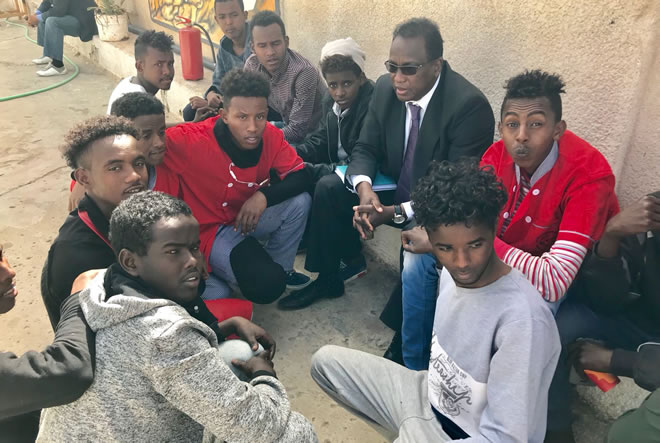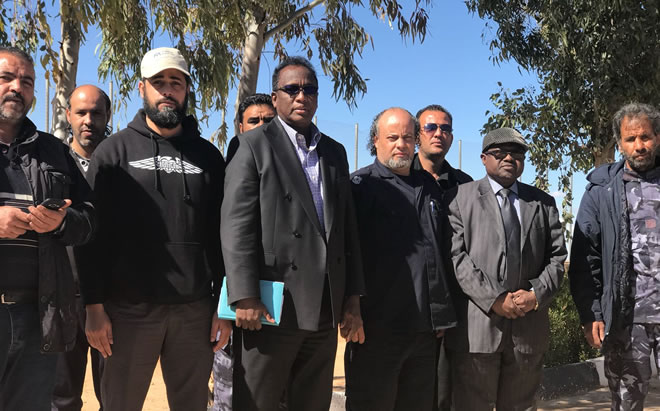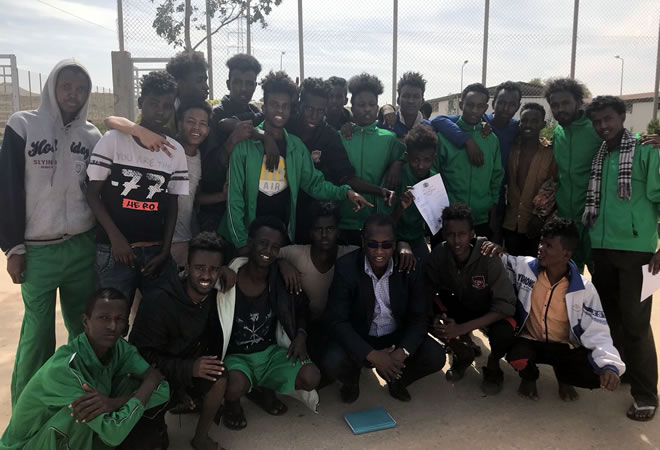Wednesday, March 21, 2018
Dr. Ali Said Faqi

Dr. Ali Said with young Somalis ready to go home
Background
At the margins of the 5th AU/EU summit which was held in Abidjan- Ivory Coast on November 29-30, 2017, President Mohamed Abdullahi Farmajo has asked me to work on a plan to evacuate our nationals stranded in Libya following the grim report by the CNN that indeed young Africans were sold as slaves in Libya. Not knowing exactly what to do and where to start, I decided to give a call to a good friend of mine, Ms. Maryan Yassin; that call has led to further discussions, meetings in Brussels with EU institutions and connections with IOM Somalia and Libya. I and Maryan then agreed to schedule our first visit to Tripoli from Tunis on January 18, 2018 to assess the situation. Unfortunately, due to a fierce fighting around the Airport in Tripoli, the trip had to be cancelled as the airport remained closed for 5 Days. Nevertheless, on February 12, 2018, with the addition of Mr. Ahmed Dahir to the team, we have decisively embarked into a journey to Libya for the first time- a journey into the unknown, and full of adventures.
Upon arrival to Libya, we rushed to our Embassy in Tripoli and were warmly received by the charge d’affair and other staff of the Embassy. We then met with young migrants who were at the Embassy waiting for our arrival. As I listened their stories, I felt I was watching horror movies; not knowing exactly how to comfort them; the only thing I could do was to tell them what they've been through was indeed horrific and the Somali government is here to help them. They were eager to speak and share their stories; their narratives were all common namely suffering from hunger, thirsty, abuses, torture, rape, force labor, and diseases (such as scabies, Tuberculosis, etc.). On the second day of our trip, two Somali migrants from Ethiopia were brought to the Embassy with the help of other Somali migrants after being released by a smuggler/broker. They looked thin and seriously sick. Both of them were admitted to a hospital and two days later, sadly one of them passed away.
On the last day of our 3 day trip in Tripoli, as the painful realities began unfolding I made a conscious decision and opted to stay longer, while the rest of the team have to escort the first 13 migrants from Tripoli to Mogadishu, Somalia.

Libyan authority has facilitated my movements in and out of Tripoli
The Trip
Based on the realities in the ground and with unexpected vast number of parents, siblings, relatives and family friends contacting me to trace their loved ones in Libya, it became immediately clear that the expectation was too high to just cut the trip short. I felt obliged to do something at least reach out the migrants in the detention centers. In any way, a three Day trip has very much turned into a 25 Day trip. I must admit that without the support of the Libyan Government, my trip would have been fruitless. The Libyan authority has facilitated my movements in and out of Tripoli to visit detention centers where illegal migrants were detained. I am extremely thankful to the Ministry of Foreign Affairs and Ministry of Interior-Department of illegal migrants for providing me escorts during my visits, particularly at the Khumz and Gariyan detention centers. Likewise, my thanks goes to IOM (UN agency for Migration) Somalia and Libya who are relentlessly working hard to evacuate the Somali migrants willing to return to Somalia. The trip was filled with emotions, sadness, hopelessness, uncertainty, fear, and exhaustion.
I was permitted to visit all the detention centers managed by the government in and around Tripoli area. These centers were packed with African youth from West, Central and East Africa. The living conditions of these centers are extremely undesirable, but considering the enormous number of migrants in Libya and the current political situation in the country, I must acknowledge the Libyan authority is doing all it can to deal with the immense migrant crisis that it is facing.
My daily encounter with the migrants has led me to grasp the push factors that are compelling these youth to go through this ordeal journey to Europe. It is indeed the complete lack of future prospects in the country of origin and honestly they feel their leaders had failed them. The urge to embark into this risky trip is the results of political corruption and lack of security and stability in many African countries. It is certainly as if African youth were born to be in despair for their entire life. They have nothing in their home country and awfully living in misery, and servitude overseas.

Outside of the government controlled areas, there are thousands of migrants who are locked up by the ruthless smugglers and it is impossible to reach them.
In some shelters there are individuals from Somalia, Djibouti, Sudan, Ethiopia or Eritrea working for the Libyan smuggler/broker and doing most of the beatings of the migrants. There are migrants in some of these shelters who have been locked up for years as their parents cannot afford paying the ransom money ordained. These migrants who are mostly from Africa are often nicked-named vampires because of their very bad physical conditions as they are deprived of food and water, waiting to die. The world must urgently do something to safe these migrants; whether it is a political or military means; it is the only viable solution available to end this ordeal.
Human Smuggling- A Big Business
The smuggling of migrants and human trafficking is a big business, multifaceted and it is an international criminal network. Somali smugglers and traffickers recruit these boys and girls from all parts of Somalia obviously promising them a quick entry to Europe. They move them from Bosaso to Yemen to Sudan or from Hargeysa to Ethiopia and to Sudan where they sell them to Sudanese smugglers, who then drive these migrants to the desert into Libya. In Libya they get sold again, but this time to Libyan smugglers/brokers. These migrants are then moved to holding centers in Al Kufrah, Rubiana, Sabha, Ajdabia, Umu Urani and Bin Walid town, just to mention few places where they undergo daily beatings, abuses, torture, forced labors and rape. The Libyan smuggler/broker then sets up the ransom amount which could be over 10, 000 dollars. The beating of migrants in these warehouses continues daily until the ransom money is fully paid or the migrant deceases. Reliable sources confirm that BIN WALID locking up centers (estimated to be more than 30-40) are a living hell, followed by others in the far south that are run by the Tubawi, black Libyan brokers. Life in these shelters have no value as migrants are tortured to death routinely.
Upon receiving the migrants in these shelters, they are immediately required to call their parents and provide them a phone number where the ransom money should be transferred. Once the ransom money is received, the migrant is put off the list from the daily beatings and then transferred to the coastal towns of Libya such as Zawiyah, Garaboli, Sabrata or Zawara, and in the hands of other smugglers/ traffickers who will then arrange a perilous boat trip to Italy after an additional payment. However, there are cases of further kidnapping of migrants by other gang smugglers following a raid at a shelter or while on their way to the coastal towns who then demand additional ransom for their release.
Each year several boats capsize off the Libyan coast or the Mediterranean see with immense human loss. Although the number of migrants crossing the Mediterranean sea have significantly reduced, yet, the hope of making the trip to Europe is still alive, regardless of the enormous risk involved.
Reality in Somalia
Nearly, 60% of the Somali population are estimated to be under the age of 35 years. According to UN human development 67% of youth in Somalia are unemployed, and 89% live in abject poverty. This widespread unemployment among disaffected youth has invigorated extremism, piracy, political instability, and poverty. Many youth have fallen prey to the extremist group who is taking advantage of the disaffection and disillusionment of their future. Others put their lives at risk as they go on a land and boat journey in search of a better life, like those in Libya. Unfortunately, our youth are so desperate that they risk to be slaves in the midst of a very dangerous journey to Europe.
Recommendations
It is a daunting social challenges when young people experience social exclusion, lack of economic opportunities, and limited access to resources. Economic growth in our country will require us to create the conditions that allow young people to have jobs. It is therefore, essential to develop strategies to exploit the extraordinary power of youth inventiveness and enthusiasm to generate economic growth and employment. It is the only way forward to curb the youth crisis in our country. Rather than being a burden, the youth can become a demographic gift. Lack of opportunities is the main thing that separates our youth from others in developed countries. Every kid has a potential to be something provided that he/she is given opportunities.
We must also keep in mind that youth can play a decisive role in assuring peace and security. With the proper support from the government they can contribute immensely in a society’s peace building process as well.
Migrants’ nightmare in Libya has exposed the desperation of Africa’s youth. As a society we seriously need to embark into an economical plan that guarantees a better and a brighter future for the youth, otherwise, we will continue to experience similar tragedies.
H.E. Dr. Ali Said Faqi
Somali Ambassador to Benelux and EU